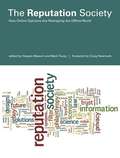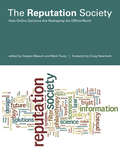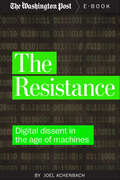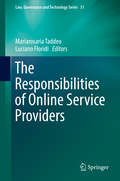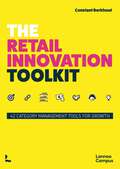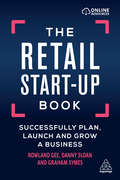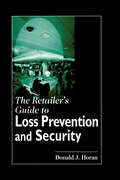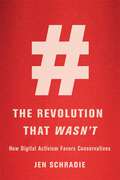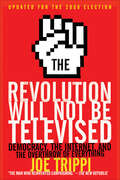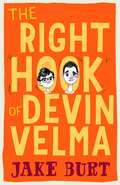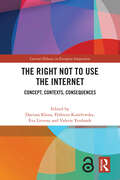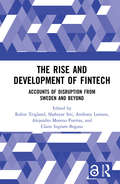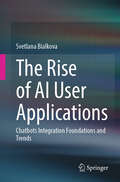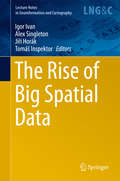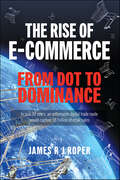- Table View
- List View
The Reputation Society: How Online Opinions Are Reshaping the Offline World
by Mark Tovey Hassan MasumIn making decisions, we often seek advice. Online, we check Amazon recommendations, eBay vendors' histories, TripAdvisor ratings, and even our elected representatives' voting records. These online reputation systems serve as filters for information overload. In this book, experts discuss the benefits and risks of such online tools. The contributors offer expert perspectives that range from philanthropy and open access to science and law, addressing reputation and reputation systems in theory and practice. Properly designed reputation systems, they argue, have the potential to create a "reputation society," reshaping society for the better by promoting accountability through the mediated judgments of billions of people. Effective design can also steer systems away from the pitfalls of online opinion sharing by motivating truth-telling, protecting personal privacy, and discouraging digital vigilantism.
The Reputation Society: How Online Opinions Are Reshaping the Offline World (The Information Society Series)
by Mark Tovey edited by Hassan MasumExperts discuss the benefits and risks of online reputation systems.In making decisions, we often seek advice. Online, we check Amazon recommendations, eBay vendors' histories, TripAdvisor ratings, and even our elected representatives' voting records. These online reputation systems serve as filters for information overload. In this book, experts discuss the benefits and risks of such online tools.The contributors offer expert perspectives that range from philanthropy and open access to science and law, addressing reputation systems in theory and practice. Properly designed reputation systems, they argue, have the potential to create a “reputation society,” reshaping society for the better by promoting accountability through the mediated judgments of billions of people. Effective design can also steer systems away from the pitfalls of online opinion sharing by motivating truth-telling, protecting personal privacy, and discouraging digital vigilantism.Contributors Madeline Ashby, Jamais Cascio, John Henry Clippinger, Chrysanthos Dellarocas, Cory Doctorow, Randy Farmer, Eric Goldman, Victor Henning, Anthony Hoffmann, Jason Hoyt, Luca Iandoli, Josh Introne, Mark Klein, Mari Kuraishi, Cliff Lampe, Paolo Massa, Hassan Masum, Marc Maxson, Craig Newmark, Michael Nielsen, Lucio Picci, Jan Reichelt, Alex Steffen, Lior Strahilevitz, Mark Tovey, John Whitfield, John Willinsky, Yi-Cheng Zhang, Michael Zimmer
The Resistance: Digital dissent in the age of machines
by Joel Achenbach The Washington PostWashington Post reporter Joel Achenbach explores our relationship with technology—frequently beneficial, occasionally adversarial, and rapidly changing in a world growing more connected by the minute. In the second decade of this new millennium, we are more connected than we have ever been, and digital utopians speak of the new wonders ahead—artificial intelligence and augmented intelligence, a merger of humans and machines, and a coming era of transhumanism that we cannot possibly imagine. But there are dissenters. They see the rise of a surveillance state. They see personal data turned into a commodity. They see profits swirling to a few huge corporations. They see basic human interactions impaired by gadgetry. The most apocalyptic thinkers fear that machines will soon escape our control. They believe artificial intelligence will be our most catastrophic invention. These people do not form a coherent movement. But if they share a common message, it's that technology should serve humans and not the other way around. Joel Achenbach explores his own relationship with the digital revolution, as well as its future, in this eye-opening, intelligent, and entertaining look at how we connect today.
The Respiratory System in Equations
by Bertrand MauryThis book proposes an introduction to the mathematical modeling of the respiratory system. A detailed introduction on the physiological aspects makes it accessible to a large audience without any prior knowledge on the lung. Different levels of description are proposed, from the lumped models with a small number of parameters (Ordinary Differential Equations), up to infinite dimensional models based on Partial Differential Equations. Besides these two types of differential equations, two chapters are dedicated to resistive networks, and to the way they can be used to investigate the dependence of the resistance of the lung upon geometrical characteristics. The theoretical analysis of the various models is provided, together with state-of-the-art techniques to compute approximate solutions, allowing comparisons with experimental measurements. The book contains several exercises, most of which are accessible to advanced undergraduate students.
The Responsibilities of Online Service Providers
by Luciano Floridi Mariarosaria TaddeoThis volume focuses on the responsibilities of online service providers (OSPs) in contemporary societies. It examines the complexity and global dimensions of the rapidly evolving and serious challenges posed by the exponential development of Internet services and resources. It looks at the major actors - such as Facebook, Google, Twitter, and Yahoo! - and their significant influence on the informational environment and users' interactions within it, as well as the responsibilities and liabilities such influence entails. It discusses the position of OSPs as information gatekeepers and how they have gone from offering connecting and information-sharing services to paying members to providing open, free infrastructure and applications that facilitate digital expression and the communication of information. The book seeks consensus on the principles that should shape OSPs' responsibilities and practices, taking into account business ethics and policies. Finally, it discusses the rights of users and international regulations that are in place or currently lacking.
The Responsive Web: The Web - Past, Present, Future
by Matthew CarverSummaryThe Responsive Web is an easy-to-read introduction to responsive web design packed with instantly useful tips and techniques, and dozens of examples that show you exactly how to benefit from this valuable approach. You'll learn innovative ways to use what you already know along with design techniques leveraging new HTML5 and CSS3 features.Purchase of the print book includes a free eBook in PDF, Kindle, and ePub formats from Manning Publications.About the BookIn a world of mobile devices, new browsers, and changing standards, each page of your website can require an unmanageably large number of separate designs. Responsive web design is a set of techniques that allow you to design pages that efficiently adapt to whatever device or platform loads them. For web designers and developers and their customers, responsive design can be a big win.The Responsive Web builds on the best practices that have shaken out over a few years of production experience. This concise book skips pure theory and shows you exactly how to make responsive web design work for you in the real world. You'll learn innovative ways to use what you already know along with design techniques leveraging new HTML5 and CSS3 features. Along the way, you'll discover strategies to balance apps and websites, manage browser incompatibilities, and learn when multiple versions are the best option.What's InsideResponsive design conceptsCSS preprocessingRapid prototyping techniquesFluid typographyFuture-proof designs About the AuthorMatthew Carver is a front-end developer and web designer with real-world responsive design experience for clients like American Airlines, The Dallas Morning News, and Chobani Yogurt.Table of ContentsPART 1 THE RESPONSIVE WAYLearning to work responsivelyDesign for mobile firstPART 2 DESIGNING FOR THE RESPONSIVE WEBUsing style tiles to communicate designResponsive user experience design patternsResponsive layoutsAdding content modules and typographyPART 3 EXPANDING THE DESIGN WITH CODEAdding graphics in the browser with CSSProgressive enhancement and obsolescence control with ModernizrTesting and optimization for responsive websites
The Retail Innovation Toolkit: 42 Category Management Tools for Growth
by Constant BerkhoutHOW TO: design an enjoyable and/or efficient shopper experience. adapt your retail format to new societal trends while keeping the retail brand differentiating. energize supplier-retailer relationships and face the challenges ahead in an open and a collaborative way. Retail is going through tremendous change as a result of new types of competitors and ever higher consumer expectations. An abundance of products, media and data has become available. Digitization and the demand for an inclusive and a sustainable society call for new ways of defining the future together. Everyone needs to be mobilized, and the category level holds the right meeting point for suppliers and retailers. The Retail Innovation Toolkit offers practical tools and case studies on the way forward, so that professionals on both retail and supplier sides can start addressing category challenges immediately. The 42 tools help professionals to analyse, grow, innovate and even reinvent categories in a fun and a quick manner. The Category Management concept is refreshed by integrating tools from Experience Design and Product Innovation to create a new set of innovation skills and mobilize collaboration within and among retailer and supplier organizations. This is an excellent toolkit with practical approaches to growing the category and reinventing the retail game.
The Retail Start-Up Book: Successfully Plan, Launch and Grow a Business
by Rowland Gee Danny Sloan Graham SymesThe retail market in the UK is worth more than £400 billion annually and employs over 3 million workers, while in the US 29 million people create over USD $4 trillion of revenue through the industry. Despite the challenge to establish stores and big-box retailers, there's a rapid increase in the number of retail start-ups and consistent growth in the independent sector. From beard shops and barbers, through cafes and coffee shops, to 'retailment' concept stores and boutique consumer-focused experiences, the specialist retail sector is booming. The Retail Start-Up Book provides clear guidance and advice on how to develop a winning retail strategy that seamlessly merges online, offline and digital tactics. Introducing the science of shopping and how to understand customer behaviours and needs, it explores the essential steps of developing a business plan, marketing and promoting a business and advising on buying and visual merchandising. Building on years of retail experience nationally and internationally, in large groups and with independent retailers, The Retail Start-Up Book meticulously provide invaluable practical insights to help new retailers hit the floor running, or more established organizations grow their business and nurture their profits.
The Retailer's Guide to Loss Prevention and Security
by Donald J. HoranThe Retailer's Guide to Loss Prevention and Security is an introduction to retail security. It covers the basic principles, the various techniques and technologies available, and the retailer's interaction with the police, courts, and the law.Donald J. Horan, President of Loss Control Concepts, Ltd., lends to this book his vast experience in the retail business and as a loss control consultant. Designated a Certified Protection Professional by the American Society for Industrial Security, he is also a member of the International Association of Professional Security Consultants (IAPSC). He has directed and managed retail loss prevention programs all over the U.S. for major department stores and specialty chains, and has provided his expertise to a host of client companies during his tenure with the National Loss Prevention Bureau. Donald Horan's practical experience fills this book with all the tips, strategies, and procedures you need to create an effective loss prevention program.Owners, managers, and security managers of small and medium-sized retail operations; security agencies; individuals, institutions, and companies that give seminars on the topic; and personnel in law enforcement and forensics will find this an essential text. It will be extremely helpful to senior corporate executives to whom the loss prevention/security function reports, because it is their responsibility to determine whether loss prevention practices conform to the long-term goals of the company. Growing retail businesses and those contemplating future acquisitions for expansion will find the work invaluable. The same can be said for turn-around ventures or downsized businesses emerging from reorganization. The book would also be easily adaptable for use in undergraduate courses in an accredited criminal justice or retail management program.
The Revealers
by Doug WilhelmThrowing light on a dark problem: Parkland Middle School is a place the students call Darkland, because no one in it does much to stop the daily harassment of kids by other kids. <P><P>Three bullied seventh graders use their smarts to get the better of their tormentors by starting an unofficial e-mail forum at school in which they publicize their experiences. <P>Unexpectedly, lots of other kids come forward to confess their similar troubles, and it becomes clear that the problem at their school is bigger than anyone knew. <P>The school principal wants to clamp down on the operation, which she does when the trio, in their zealousness for revenge, libel a fellow student in what turns out to have been a setup. <P>Now a new plan of attack is needed ... <P>This suspenseful story of computer-era underground rebellion offers fresh perspectives on some of the most enduring themes in fiction for young readers.
The Revolution That Wasn’t: How Digital Activism Favors Conservatives
by Jen SchradieIn this counterintuitive study of digital democracy, Jen Schradie shows how the web has become another weapon in the arsenal of the powerful, and a potent weapon for conservative activists. Rather than leveling the playing field, the internet has tilted it in favor of the Right, where only the most sophisticated and well-funded players can compete.
The Revolution Will Not Be Televised: Democracy, the Internet, and the Overthrow of Everything
by Joe TrippiIn a blend of Wired magazine and The Boys on the Bus, the man who invented Internet politics tells the story of how it was done and reveals how every sector can benefit from tech revolution.Campaign manager Joe Trippi, who signed on to run Howard Dean’s campaign when there was less than $100,000 in the till and fewer than 500 people involved, transformed the most obsure candidate in the field into the Democratic frontrunner and all-but-coronated party nominee in less than a year. The secret of Trippi’s off-the-charts success: a revolutionary use of the Internet, and an impassioned, contagious desire to overthrow politics-as-usual. Before Dean knew it, he had a groundswell of 600,000 Americans behind him, was leading in every poll, and had raised $45 million—more money than any Democrat in history. We now know that unprecedented fundraising, unheard-of numbers of people checking in on the Internet, chatting on blogs, reaching out to their fellow voters and showing up at house parties really can compete with—and in so many ways exceed— the more traditional approaches to winning in politics. But the why’s and how’s leave much fertile ground to plow, and for the first time, Trippi, an icon to all the Dean supporters he energized, is sharing his lessons learned, along with colorful behind-the-scenes stories from the campaign trail. Perhaps lulled by the bust of the dot.com boom, many have dismissed the Internet as old news. But if Dean’s campaign wasn’t enough of a wake-up call, this book is: Trippi reveals just how the sleeping power of technology can be harnessed, and illuminates how every organization and individual in America can benefit from the tidal wave of change on the horizon.
The Rhetoric of Videogames as Embodied Practice: Procedural Habits (Routledge Studies in Rhetoric and Communication)
by Steve HolmesThe Rhetoric of Videogames as Embodied Practice offers a critical reassessment of embodiment and materiality in rhetorical considerations of videogames. Holmes argues that rhetorical and philosophical conceptions of "habit" offer a critical resource for describing the interplay between thinking (writing and rhetoric) and embodiment. The book demonstrates how Aristotle's understanding of character (ethos), habit (hexis), and nature (phusis) can productively connect rhetoric to what Holmes calls "procedural habits": the ways in which rhetoric emerges from its interactions with the dynamic accumulation of conscious and nonconscious embodied experiences that consequently give rise to meaning, procedural subjectivity, control, and communicative agency both in digital game design discourse and the activity of play.
The Right Hook of Devin Velma
by Jake BurtFrom the author of Greetings from Witness Protection! comes another unforgettable middle-grade novel about friendship and family.Devin wants to hit it big on the internet by pulling a stunt at an NBA game—one the entire nation will be watching. Addison can’t turn Devin down, but he can barely manage talking to his teachers without freezing up. How’s he supposed to handle the possibility of being a viral sensation?Addi’s not sure why Devin is bent on pulling off this almost-impossible feat. Maybe it has something to do with Devin’s dad’s hospital bills. Maybe it all goes back to the Double-Barreled Monkey Bar Backflip of Doom. Or maybe it’s something else entirely. No matter what, though, it’s risky for both of them, and when the big day finally comes, Devin’s plan threatens more than just their friendship.With memorable protagonists and a wonderful supporting cast, The Right Hook of Devin Velma is a one-of-kind knockout in middle-grade fiction.
The Right Not to Use the Internet: Concept, Contexts, Consequences (Current Debates in European Integration)
by Dariusz Kloza Eva Lievens Elżbieta Kużelewska Valerie VerdoodtThis pioneering collection addresses the prospective fundamental/human right not to use the Internet and the challenges that the non- use of the Internet poses for democracy.As the Internet has increasingly ceased to be a mere option and rather turned into a de facto obligation for anyone who exercises their rights or fulfils duties, these developments bring about profound ramifications for the very existence and the functioning of democracy, and therefore merit a critical reflection. With contributors from academia and legal practice from all over Europe, this edited volume offers timely critical analysis of the right not to use of the Internet, at times supplemented with policy advice and postulates for law reform.This book is of key interest to scholars and students of – predominantly – law, political science and philosophy as well as to policymakers, judges and nongovernmental organisations at national, supranational and international levels.The Open Access version of this book, available at www.taylorfrancis.com, has been made available under a Creative Commons Attribution-Non Commercial-No Derivatives (CC-BY-NC-ND) 4.0 license.
The Right To Be Forgotten: A Comparative Study of the Emergent Right's Evolution and Application in Europe, the Americas, and Asia (Ius Comparatum - Global Studies in Comparative Law #40)
by Franz WerroThis book examines the right to be forgotten and finds that this right enjoys recognition mostly in jurisdictions where privacy interests impose limits on freedom of expression. According to its traditional understanding, this right gives individuals the possibility to preclude the media from revealing personal facts that are no longer newsworthy, at least where no other interest prevails. Cases sanctioning this understanding still abound in a number of countries. In today’s world, however, the right to be forgotten has evolved, and it appears in a more multi-faceted way. It can involve for instance also the right to access, control and even erase personal data. Of course, these prerogatives depend on various factors and competing interests, of both private and public nature, which again require careful balancing. Due to ongoing technological evolution, it is likely that the right to be forgotten in some of its new manifestations will become increasingly relevant in our societies.
The Right to Data Protection: Individual and Structural Dimensions of Data Protection in EU Law (Information Technology and Law Series #34)
by Felix BiekerThis book advances an approach that combines the individual and the structural, systemic dimensions of data protection. It considers the right to data protection under the EU Charter and its relationship to the secondary legislation. Furthermore, the case law of the Court of Justice of the EU as well as current academic conceptualizations are analysed. The author finds that current approaches invariably link data protection to privacy and often fail to address the structural implications of data processing. He therefore suggests a dualistic approach to data protection: in its individual dimension, data protection aims to protect natural persons and their rights, while the structural dimension protects the democratic society as a whole from the adverse effects of data processing. Using this approach, the full potential of an independent right to data protection can be realized. Researchers, practitioners and students will find this a valuable resource on the rationales, scope and application of data protection. Felix Bieker is Legal Researcher at the Office of the Data Protection Commissioner of Schleswig-Holstein (Unabhängiges Landeszentrum für Datenschutz) in Kiel, Germany.
The Right to Privacy 1914–1948: The Lost Years (SpringerBriefs in Law)
by Megan RichardsonThe book offers a provocative review of thinking about privacy and identity in the years encompassing and disrupted by the two world wars of the first half of the twentieth century – focusing (in particular) on the socio-technological transformations associated with modernism. It argues that, with many of the most interesting modern thinkers of the period dead or marginalised (or both) by 1948, their ideas about how rights such as privacy should develop to accommodate the exigencies of modern life failed to find much of a voice in the drafting of the Universal Declaration of Human Rights. Yet they anticipated in surprising ways some of our ‘new’ ways of thinking in more recent times. After a brief introduction, the chapters are framed in terms of case studies on the right to privacy, the right to data protection and the right to be forgotten, each finishing with a consideration of how these rights require further rethinking in the digital century.
The Rise and Development of FinTech: Accounts of Disruption from Sweden and Beyond (Routledge International Studies in Money and Banking)
by Robin Teigland Shahryar Siri Anthony Larsson Alejandro Moreno Puertas Claire Ingram BoguszThis comprehensive guide serves to illuminate the rise and development of FinTech in Sweden, with the Internet as the key underlying driver. The multiple case studies examine topics such as: the adoption of online banking in Sweden; the identification and classification of different FinTech categories; process innovation developments within the traditional banking industry; and the Venture Capital (VC) landscape in Sweden, as shown through interviews with VC representatives, mainly from Sweden but also from the US and Germany, as well as offering insight into the companies that are currently operating in the FinTech arena in Sweden. The authors address questions such as: How will the regulatory landscape shape the future of FinTech companies? What are the factors that will likely drive the adoption of FinTech services in the future? What is the future role of banks in the context of FinTech and digitalization? What are the policies and government initiatives that aim to support the FinTech ecosystem in Sweden? Complex concepts and ideas are rendered in an easily digestible yet thought-provoking way. The book was initiated by the IIS (the Internet Foundation in Sweden), an independent organization promoting the positive development of the Internet in the country. It is also responsible for the Internet’s Swedish top-level domain .se, including the registration of domain names, and the administration and technical maintenance of the national domain name registry. The book illustrates how Sweden acts (or does not act) as a competitive player in the global FinTech arena, and is a vital addition to students and practitioners in the field.
The Rise of AI User Applications: Chatbots Integration Foundations and Trends
by Svetlana BialkovaThis monograph introduces readers to core theories and applications in the chatbot AI context. Although AI is attracting significant attention, there is a literature gap and lack of practical guidelines on the key drivers of chatbot efficiency and agency capacity. There is a caveat between algorithmic explanations and actionable understanding, despite the acknowledged importance of inherently human-centric properties. Addressing these gaps, this state-of-the-art book offers a distinctive combination of content, theory, practice evaluation, and a holistic framework encompassing cognitive, emotional and social aspects, focusing on how to enhance AI agency and user experience. The framework aims to drive design, encouraging development of intelligent systems, techniques to evaluate chatbot with purposes, to appropriately meet user needs and market demand for responsible and explainable AI, XAI. Avenues for transforming business and life by implementing new generation AI systems are further discussed, as well as recommendations to overcome consumer resistance and advice for policy measures to reduce risks given the AI boost. While the community is still in an exploratory mode, we hope “The Rise of AI User Applications: Chatbots Integration Foundations and Trends” provides the needed understanding and will inspire researchers across disciplines to combine their efforts and work together on this very intriguing topic.
The Rise of Artificial Intelligence and Big Data in Pandemic Society: Crises, Risk and Sacrifice in a New World Order
by Kazuhiko ShibuyaThis book presents a study of the COVID-19 pandemic using computational social scientific analysis that draws from, and employs, statistics and simulations. Combining approaches in crisis management, risk assessment and mathematical modelling, the work also draws from the philosophy of sacrifice and futurology. It makes an original contribution to the important issue of the stability of society by highlighting two significant factors: the COVID-19 crisis as a catalyst for change and the rise of AI and Big Data in managing society. It also emphasizes the nature and importance of sacrifices and the role of politics in the distribution of sacrifices. The book considers the treatment of AI and Big Data and their use to both “good” and “bad” ends, exposing the inevitability of these tools being used. Relevant to both policymakers and social scientists interested in the influence of AI and Big Data on the structure of society, the book re-evaluates the ways we think of lifestyles, economic systems and the balance of power in tandem with digital transformation.
The Rise of Big Spatial Data
by Alex Singleton Igor Ivan Jiří Horák Tomáš InspektorThis edited volume gathers the proceedings of the Symposium GIS Ostrava 2016, the Rise of Big Spatial Data, held at the Technical University of Ostrava, Czech Republic, March 16-18, 2016. Combining theoretical papers and applications by authors from around the globe, it summarises the latest research findings in the area of big spatial data and key problems related to its utilisation. Welcome to dawn of the big data era: though it's in sight, it isn't quite here yet. Big spatial data is characterised by three main features: volume beyond the limit of usual geo-processing, velocity higher than that available using conventional processes, and variety, combining more diverse geodata sources than usual. The popular term denotes a situation in which one or more of these key properties reaches a point at which traditional methods for geodata collection, storage, processing, control, analysis, modelling, validation and visualisation fail to provide effective solutions. >Entering the era of big spatial data calls for finding solutions that address all "small data" issues that soon create "big data" troubles. Resilience for big spatial data means solving the heterogeneity of spatial data sources (in topics, purpose, completeness, guarantee, licensing, coverage etc. ), large volumes (from gigabytes to terabytes and more), undue complexity of geo-applications and systems (i. e. combination of standalone applications with web services, mobile platforms and sensor networks), neglected automation of geodata preparation (i. e. harmonisation, fusion), insufficient control of geodata collection and distribution processes (i. e. scarcity and poor quality of metadata and metadata systems), limited analytical tool capacity (i. e. domination of traditional causal-driven analysis), low visual system performance, inefficient knowledge-discovery techniques (for transformation of vast amounts of information into tiny and essential outputs) and much more. These trends are accelerating as sensors become more ubiquitous around the world.
The Rise of BlueAnon: How the Democrats Became a Party of Conspiracy Theorists
by David HarsanyiDavid Harsanyi delves into the mindset of people who think Republicans would usher in the Handmaid's Tale and who compare Trump's Madison Square Garden rally to a pro-Nazi rally held there eight decades earlier. In The Rise of BlueAnon, David Harsanyi reveals how the left has been consumed by a uniquely dangerous and delusional brand of conspiracy theories. And unlike those on the right, the Left’s conspiracy theories are rarely kept in check by mainstream institutions. How many Democrats are donning tinfoil hats? Way more than the media will admit:· A recent poll found nearly twice as many Democrats as Republicans believed “the Holocaust is a myth.” · Historically, Democrats are more likely to be 9/11 “Truthers." · Democrats have been accusing Republicans of stealing elections since Reagan defeated Carter.· Despite their lawn signs declaring, “science is real,” Democrats are twice as likely to believe in astrology as Republicans. · Most of the Americans who believe that alien spacecraft are observing our planet right now are Democrats. · Democrats have spread the most successful conspiracy theory in American history: The Trump-Russia collusion hoax. From shrieks that we’re just one election away from living in The Handmaid’s Tale, to shrills that the world will end in 12 years from a corporation-caused climate catastrophe, Democrats have whipped themselves up with unfounded fears and falsehoods.Virtually all mainstream media experts, pundits, and late-night talk-show hosts claim that conservatives are a bunch of unhinged conspiracy theorists. The Rise of BlueAnon is a fun, hard-hitting, and insightful refutation of this myth, and it shows why so many Democrat accusations are, in reality, projections.
The Rise of E-Commerce: From Dot to Dominance
by James RoperThe amazing and authoritative story of e-commerce: its origins, evolution and astonishing ascendence. The amazing and authoritative story of e-retail: its origins, evolution and astonishing ascendance. Meet the pioneers and businesses that explored the possibilities of the emerging virtual world, review the technology innovations that paved the way, and journey the rocky road to domination for the online shopping industry. As the founder of the UK’s industry association for e-commerce (IMRG), author James Roper was there from its inception… ‘An important and well-timed book about how the humdrum business of shopping was reinvented online. James Roper is a persuasive advocate for the role of collaboration in innovation, who was instrumental in jumpstarting the e- retail industry by methodically tackling every obstacle that blocked its early progress… In this book, Roper offers a fascinating glimpse at how a motley assemblage of inventions evolved, often in surprising ways, into today’s staggeringly powerful e-retail industry. Stuffed with eye-opening facts and statistics The Rise of e-Commerce is an essential read for anyone who is interested in the evolution of modern retailing.’ Nick Robertson, Co-founder and Ex-CEO, ASOS
The Rise of Games and High-Performance Computing for Modeling and Simulation
by National Research Council of the National AcademiesThe technical and cultural boundaries between modeling, simulation, and games are increasingly blurring, providing broader access to capabilities in modeling and simulation and further credibility to game-based applications. The purpose of this study is to provide a technical assessment of Modeling, Simulation, and Games (MS&G) research and development worldwide and to identify future applications of this technology and its potential impacts on government and society. Further, this study identifies feasible applications of gaming and simulation for military systems; associated vulnerabilities of, risks to, and impacts on critical defense capabilities; and other significant indicators and warnings that can help prevent or mitigate surprises related to technology applications by those with hostile intent. Finally, this book recommends priorities for future action by appropriate departments of the intelligence community, the Department of Defense research community, and other government entities. The Rise of Games and High Performance Computing for Modeling and Simulation will serve as a useful tutorial and reference document for this particular era in the evolution of MS&G. The book also highlights a number of rising capabilities facilitated by MS&G to watch for in the coming years.
